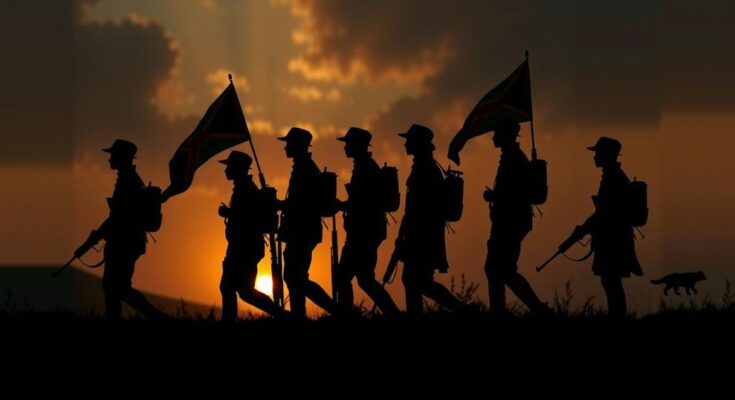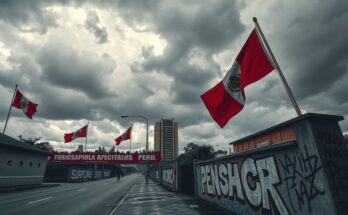The remains of 42 South African freedom fighters were returned from Zimbabwe and Zambia, marking a significant step in honoring their contributions to the anti-apartheid struggle. This repatriation aims to provide closure to families and educate future generations on the sacrifices made during the struggle.
On Wednesday, the remains of 42 South African freedom fighters, who perished in exile in Zimbabwe and Zambia during the struggle against apartheid, were solemnly returned to their homeland. These remains were received at the Waterkloof Air Force Base in Pretoria, where government officials and family members gathered to honor their legacy after their exhumation in the two neighboring countries. This repatriation effort is part of a broader governmental initiative aimed at providing closure to the families of those who fought against white minority rule, many of whom died far from home while actively participating in organizations such as the African National Congress (ANC) and the Pan Africanist Congress. This initiative symbolizes the South African government’s commitment to acknowledging the sacrifices made by these individuals during the anti-apartheid movement. Prior to the dismantling of the apartheid regime in 1994, numerous activists sought military training abroad to return and conduct armed struggles against oppression. They left to evade arrest from the apartheid government and chose Zimbabwe and Zambia due to the strength of the anti-racist movements operating there. The headquarters of the ANC, led by Nelson Mandela, was notably relocated to Lusaka, Zambia, during this period, where many exiles ultimately met their fate. Among those whose remains were repatriated were significant figures such as Duma Nokwe, Florence Mophosho, and Basil February. On the occasion of a Heritage Day event, South Africa’s Deputy President Paul Mashatile noted that the repatriation reflects an essential effort to educate future generations regarding the pivotal contributions of numerous individuals in the fight against apartheid. “As a national memory project, this initiative aims to commemorate, celebrate, educate, promote, preserve, conserve, and provide a durable testament to South Africa’s road to freedom,” Mr. Mashatile expressed. Additionally, a homecoming ceremony hosted by President Cyril Ramaphosa is scheduled for Friday, during which the remains will be ceremoniously handed over to their families for reburials across the nation. The government has also indicated ongoing efforts to repatriate additional remains of South Africans from other nations, including Lesotho, Ethiopia, Tanzania, Angola, and Russia. Deputy Defense Minister Bantu Holomisa emphasized the significance of connecting more families with their lost loved ones, stating, “I hope this process will culminate in getting more people in other countries who died under difficult conditions. We welcome them back to connect with their families.”
The article addresses the recent repatriation of the remains of South African freedom fighters who died in exile during the anti-apartheid struggle. This act of return is part of a government initiative aimed at acknowledging the sacrifices made by individuals involved in the struggle against racial oppression in South Africa. The context of the article highlights the historical importance of these fighters, many of whom sought refuge in neighboring countries to evade persecution while planning and executing their fight against the apartheid regime. The repatriation symbolizes a commitment to honoring their memory and providing closure for families enduring the pain of loss. It is also part of a larger effort to educate future generations about the nation’s challenging path to freedom.
The repatriation of the remains of South African freedom fighters from Zimbabwe and Zambia signifies a crucial step towards acknowledging the profound sacrifices made during the anti-apartheid struggle. This initiative not only offers closure to the families of the deceased but also serves to educate current and future generations on the historical context of their efforts against racial oppression. As additional remains are repatriated, the South African government remains committed to honoring and preserving the legacy of those who fought for freedom and justice in their homeland.
Original Source: www.newsday.com




